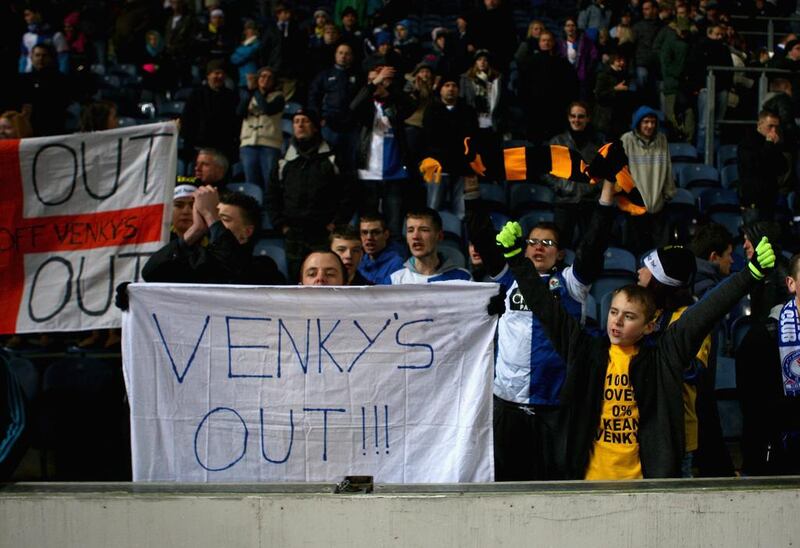The numbers always looked embarrassing for Blackburn Rovers. They used 39 players, five managers, including caretakers, were appointed and a club with high ambitions finished a lowly 17th.
Yet, arguably, the figures presented to the taxman were worse. The annual accounts submitted by Venky’s London Limited, the team’s parent company, to the United Kingdom’s Inland Revenue indicate the cost of chasing the dream of Premier League football, the extent to which second-tier Championship clubs are reliant upon broadcast income and parachute payments, and underscore the scale of the financial mismanagement at Ewood Park.
The numbers show that Blackburn, relegated from the Premier League in 2012, took a £27.1 million (Dh159.6m) loss in the 2012/13 financial year, that their turnover, £35.7m, was less than their wage bill, £39.6m. They highlight that broadcasting rights of £24.9m accounted for more than two-thirds of the team’s income and that a club that spent £62.8m in 12 months recouped just £5.2m in gate receipts.
Blackburn only banked a further £900,000 in sponsorship and advertising, and £2.7m in commercial income, compared to £2.5m and £4.7m, respectively, the previous year in the top flight.
To compound the disastrous nature of the figures, Blackburn spent £3.5m on agents’ fees last season, the most in the Championship; to put that another way, the majority of the money they received from ticket sales went to middle men in transfer deals.
All of which would have been bad enough had Blackburn flourished on the pitch. Instead, they flirted with relegation to the third-tier League One.
Venky’s, the Indian poultry firm who bought Rovers in 2010, sacked manager Sam Allardyce, appointed Steve Kean and presided over the subsequent decline, may have to cover the loss. Some will say that is right; this is a mess they created.
Rishi Sikka’s fine recent documentary Venky’s: The Fall of Blackburn Rovers, delved into their unpopular, unaccountable regime, but given the owners’ continued reluctance to comment publicly, an air of mystery remains.
What can be said for certain is that the figures would be worse but for £16m in parachute payments, the solidarity funds granted by Premier League clubs to their relegated brethren.
Blackburn will receive £32m over the first two seasons and £48m over four. Last summer, it was already thought around Ewood Park that Rovers were gambling on spending two years’ parachute payments in one go in an attempt to go straight back up to the Premier. It was strenuously denied then, but the numbers suggest it was true.
The size of Blackburn’s failure has also brought a rethink. After a civil war between competing factions in the administration at Ewood Park trying to run the club, operations director Paul Agnew was dismissed in June while his enemy, global advisor Shebby Singh, has not been seen at the club since April. The team refuse to answer questions about his role or whereabouts.
Only managing director Derek Shaw remains, while the former youth and reserve-team manager Gary Bowyer has been given the manager’s job, charged with using younger, cheaper players as expensive underachievers are off-loaded.
“After suffering relegation from the Premier League, there was an influx of new signings, including a number of high-profile players on lucrative contracts, in the hope that we would make an immediate return to the top flight,” Shaw said.
“Regrettably, those moves didn’t work out, both in terms of results on the pitch and from a financial point of view, which is something we have worked hard to put right this summer. We’re working very hard to try and get our finances in line with the Championship clubs, but there’s a lot of overlapping with contracts and the newer contracts we’ve done are Championship-type salaries.”
It will take time. It is worth remembering that the accounts only cover the 2012/13 financial year, which ended on March 31, and that big earners, such as Danny Murphy and Nuno Gomes, parted company with the club in presumably costly fashion over the summer. A court ordered Rovers to pay £2.25m in compensation to sacked manager Henning Berg, whose reign only lasted 57 days and included one win, in April.
Because of past mistakes, there will be some unpleasant figures in next year’s accounts, too. Once again, the grisly picture will be presented to the taxman first.






